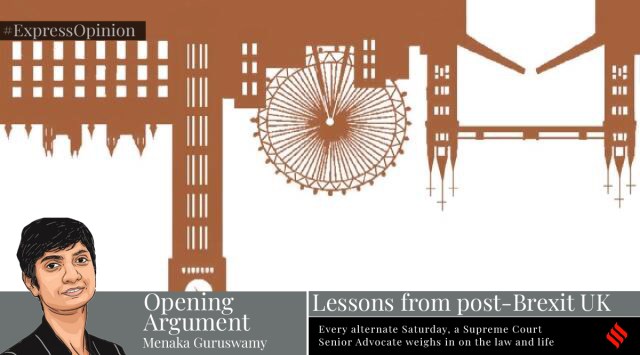
Much has changed in the United Kingdom since January 31, 2020 when it withdrew from the European Union. A recent work trip to the UK over the summer recess of the Supreme Court, revealed a country with high inflation, boarded-up shops and restaurants, and a palpable dearth of labour. On the morning of June 27, I was astonished to read the main headline of the frontpage of a leading newspaper.
Senior doctors of the National Health Service had voted to go on strike. They would go on a two-day strike over pay for the first time in 50 years to reverse deep cuts in their salaries. This would considerably worsen healthcare in the UK, given that after Brexit there was already a shortage of doctors. More than 4,000 European doctors have left the NHS.
The Migration Observatory at Oxford University in August 2022 explains that in sectors like hospitality, transport and storage, which have relied heavily on EU workers, there is an immense shortage of workers. They also note that in some sectors like agriculture, employers have been able to switch from EU to non-EU workers. But, in most low wage industries, the immigration system does not permit them to do so. The “free movement” of labour from the UK to and from the EU ended on December 31, 2021. Formal estimates indicate a shortage of 330,000 workers.
It’s well reported that since Brexit and leaving the EU, as of now, the UK faces a recession and cost of living crisis. Inflation is at a 40-year high. The governor of the Bank of England, Andrew Bailey has noted that the “hole in the UK job markets” could add to inflation woes.
Amid this general crisis in the UK, an important decision came down from the Court of Appeal on June 29, 2023. Ten individual asylum seekers from Syria, Iraq, Iran, Vietnam, Sudan and Albania and one charity, Asylum Aid, went to court. The asylum seekers had arrived in the UK irregularly by crossing the English Channel from France in small boats.
In April 2022, the Conservative government introduced the policy of sending some asylum seekers on “a one-way ticket to Rwanda” as the BBC terms it. Essentially, the governments of the UK and Rwanda entered into a Memorandum of Understanding on April 14, 2022, that Rwanda would be treated as a “safe third country” under immigration laws in the UK.
Schedule 3 to the Asylum and Immigration (Treatment of Claimants) Act 2004 allows the government, as long as it obtains Parliamentary approval to designate particular countries as “safe”. Hence, under this new policy some who had irregularly entered the UK would be sent 6,500 kilometres away to Rwanda, where their asylum claims would be dealt with.
The appellants were challenging both the legality of the Rwanda policy in general and the specifics of the 10 individual cases as well. That is the legal procedure followed in each of the 10 specific cases. The other central issue before both the High Court and the Court of Appeal was whether the asylum system in Rwanda was capable of “delivering reliable outcomes”. The case was first argued before the High Court that entertained challenges to both the general Rwanda policy and the individual cases. While it declined the challenge to the general policy, it found that in the 10 specific cases the removal to Rwanda was vitiated on grounds of “procedural unfairness”.
The government did not appeal the court findings on the individual 10 specific cases. Which is credit to the litigation supervisors of the UK government, given that in India, government departments will almost always appeal adverse court rulings even if the law is starkly against them.
At the Court of Appeal, the decision of the majority comprising the Master of the Rolls, Sir Geoffery Vos, and Lord Justice Underhill is that the “deficiencies in the asylum system in Rwanda” are such that “there are substantial grounds for believing a real risk that persons sent to Rwanda will be returned to their home countries where they faced persecution or other inhuman treatment, when in fact they have a good claim to asylum”. In that sense Rwanda is not a “safe third country”. The conclusion is founded on the evidence which was before the High Court that “Rwanda’s system for deciding asylum claims was in the period up to the conclusion of the Rwanda agreement, inadequate”.
The Court is unanimous in accepting that the “assurances given by the Rwandan government were made in good faith and were intended to address any defects in its asylum processes”. However, the majority believes that the evidence does not establish that the necessary changes had by then been reliably effected or would have been at the time of the proposed removals.
In consequence, sending anyone to Rwanda would constitute a breach of article 3 of the European Convention on Human Rights with which Parliament has required that the government must comply. The Court also made it clear that its decision implies no view whatsoever about the political merits or otherwise of the Rwanda policy. The Court notes that “those are entirely a matter for the government”. The Court’s only concern was whether the policy complies with the law as laid down by Parliament.
As I walked around London, a capital in decline, I reflected on the hostility to migrants that led to Brexit and a subsequently harsh immigration policy. Such harshness includes the deterrent lesson that should you enter the country irregularly, you may be sent 6,500 kilometres away to a far-off country to have your asylum claim decided on. Voters should be very careful what they vote for. For a vote for closing of a country could well mean a derailing of all that is good in an interconnected world — where people, commerce and ideas move across borders. In our interconnectedness is our mutual prosperity.
The writer is a Senior Advocate at the Supreme Court